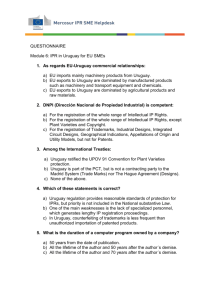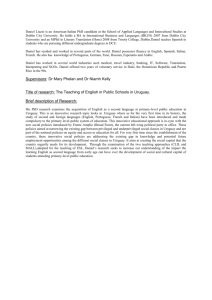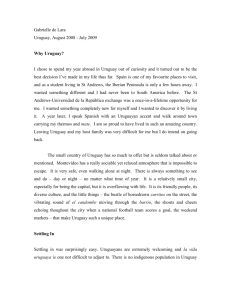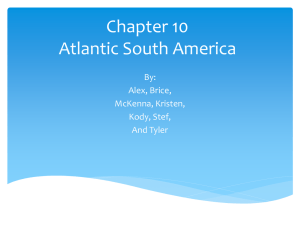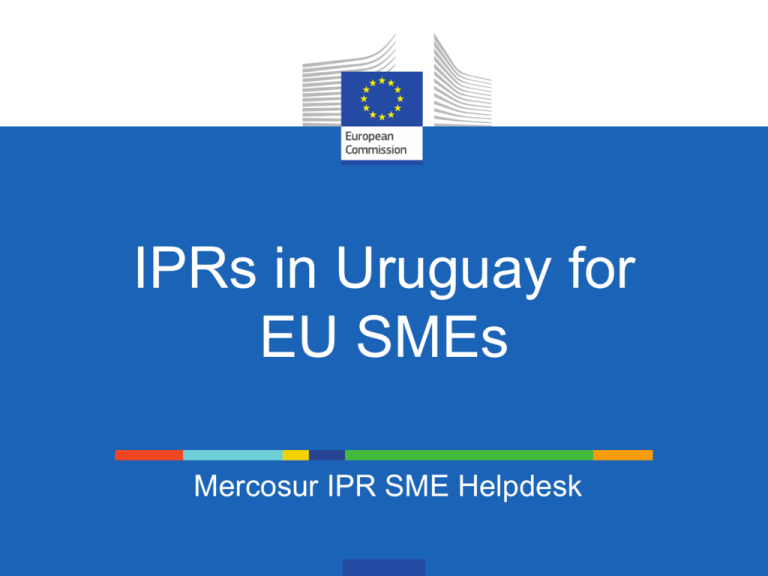
IPRs in Uruguay for
EU SMEs
B
R
A
Z
IL
P
A
R
A
G
U
A
Y
Mercosur IPR SME Helpdesk
INDEX
o INVEST IN URUGUAY
o Why invest in Uruguay
o IPR Statistics
o Innovation Statistics
o IP Responsible Institutions & International Treaties
o Main IPRs in Uruguay
•
•
•
•
•
Patents
Industrial Designs
Trademarks
Copyright
Software
o IPR Enforcement
o Additional information
IPRs IN URUGUAY FOR EU SMEs
WHY INVEST IN URUGUAY
WHY INVEST IN URUGUAY
EU- Uruguay Market:
•
•
EU-Uruguay total bilateral trade amounted to €2.9
billion in 2012.
The EU is currently Uruguay's third trading partner
after China and Brazil capturing 15% of its total
trade.
WHY INVEST IN URUGUAY
EU- Uruguay Market:
•
GDP in 2013: € 55.71 billion (Source: World Bank)
•
Annual growth rate (first half of 2013): 1.6% (Source: World Bank)
•
EU export in goods in 2012: € 1.7 billion
•
EU import in goods in 2012: € 1.2 billion
•
EU export in services in 2011: € 1.0 billion
•
EU import in services in 2011: € 0.4 billion
WHY INVEST IN URUGUAY
EU- Uruguay Market:
•
•
•
•
EU exports to Uruguay are dominated by manufactured products such as
machinery and transport equipment (44%) and chemicals (25%) (2013 data).
EU imports from Uruguay are dominated by agricultural products and raw
materials (86% in 2013).
The EU is the most important investor in Uruguay with, and €7 billion in
stocks of foreign direct investment in the country in 2012 (forestry and
paper production)
In recent years EU exports of services to Uruguay have been growing fast,
from €0.8 billion in 2010 to €1.2 billion in 2012.
IP STATISTICS
o IPR activity by residents and non-residents
— patent system is largely used by non-residents (about 90% of
applications are done by non-residents).
— Trademarks - 70% of the applications were made by non-residents.
o During 2014, the IP Office (DNPI) received
— 795 patent applications (including patents, utility models and designs)
and 150 were granted
— 9.977 trademark applications (5.836 new applications, 4.140
renewals,6.203 of them were made by non-residents) and 10.603 were
granted.
o The technological areas with more patent applications in 2013 were:
— Medical technology
— Pharmaceuticals
— Biotechnology
IP STATISTICS
Application
2011
2012
2013
2014
Patents
688
703
691
679
Residents
20
14
21
35
Non-residents
668
689
670
644
Utility Models
43
57
47
30
Residents
36
40
37
23
Non-residents
7
17
10
7
Industrial
Designs
Residents
106
118
92
79
41
13
21
20
Non-residents
65
105
71
59
Total
837
878
830
795
IP STATISTICS
Patent Applications by Top Fields of Technology (1999 - 2013)
Field of Technology
Share
Medical technology
13.85
Pharmaceuticals
8.39
Biotechnology
6.35
Furniture, games
5.97
Computer technology
5.84
Civil engineering
4.96
Engines, pumps, turbines
4.96
Other special machines
4.57
Engines, pumps, turbines
4.08
Pharmaceuticals
4.06
Others
45.47
Pharmaceuticals,
biotechnology,
chemicals,
electronics,
telecommunications
and software are
considered the most
IP-prone sectors.
IPRS STATISTICS
Category
Score
Global Rank
Regional Rank
International Property Right Index
6.1
36 of 97
2 of 20
Protection of Physical Property
7.0
32 of 97
2 of 20
Registering Property
7.5
83 of 96
18 of 20
Intellectual Property Rights overall
5.2
53 of 97
9 of 20
Protection of Individual Property Rights 5.8
32 of 97
2 of 20
Patent Protection
6.5
59 of 97
12 of 20
Copyright Protection
3.2
53 of 80
7 of 17
INNOVATION STATISTICS
o According to the Global Innovation Index 2014, Uruguay ranked
72 out of 143 and 9 out of 22 at regional level (Latam +
Caribbean).
IPRs IN URUGUAY FOR EU SMEs
IP RESPONSIBLE INSTITUTIONS &
INTERNATIONAL TREATIES
IPR RECOGNIZED BY NATIONAL LAW
– AND RESPONSIBLE INSTITUIONS
DNPI
PATENTS
UTILITY MODELS
INTEGRATED CIRCUIT DESIGN
COPYRIGHT
PLANT VARIETIES
TRADEMARKS
APPELLATIONS OF ORIGIN
GEOGRAPHICAL INDICATIONS
INDUSTRIAL DESIGN
BIBLIOTECA
NACIONAL
INASE
X
X
X
X
X
X
X
X
X
INTERNATIONAL TREATIES RATIFIED
Berne Convention (Copyright)
Paris Convention (Industrial Property)
TRIPS Agreement (IP – WTO)
UPOV 78 (Plant Variety Rights)
Convention on Biological Diversity
Strasbourg Agreement (Patents)
Nice and Vienna Agreements (Trademarks)
Uruguay is not a party to the Patent Cooperation Treaty, Patent Law
Treaty, Madrid Protocol, Lisbon Treaty or Trade Law Treaty. Hence,
it is not possible to designate this country in a single International
application for registrations of patents or trademarks, respectively.
STRENGTHS & WEAKNESSES
OF THE IP SYSTEM
Strengths:
•
•
Uruguay is member of most IPR-related International Treaties. Thus, its
substantive Law includes the IPRs essential provisions such as priority, or
rights duration;
Uruguay regulation provides reasonable standards of protection for IPRs;
STRENGTHS & WEAKNESSES
OF THE IP SYSTEM
Weaknesses:
•
•
•
Lengthy IP registration proceedings, due to lack of specialized personnel.
Counterfeiting of trademarks (clothing, footwear, domestic appliances,
electronic devices, luxury items, spirits, soft drinks and tobacco) is widely
spread in Uruguay;
Large ammount of transit counterfeited and pirate products (i.e. CDs,
software, DVDs and books as well as copyright protected content on the
Internet)
IPRs IN URUGUAY FOR EU SMEs
MAIN IPRS IN URUGUAY:
PATENTS
PATENTS: WHAT YOU NEED TO KNOW
o What are Patents? They are exclusive rights granted by
the State for protecting an invention, which is a technical
solution for an industrial problem.
o Which kind of Patents can be protected?
Patents protect inventions such as a product or a process.
Utility Models, are ‘petty patents’, such as new or known
devices that provide an improvement, or technical effect in
the function of an object (new configuration or form).
PATENTS: WHAT YOU NEED TO KNOW
Basic patenting requirements:
• Patents of Invention must be New, imply an Inventive
Step and subject to Industrially Applicability.
• Utility Models are also patentable if they comply with
the abovementioned requirements.
Please note that, even when the requirements are the same, the Inventive Step
requirement in Utility Model have a less demanding standard than in Patents
PATENTS: WHAT YOU NEED TO KNOW
How long does legal protection last?
o Patent of Inventions protection lasts 20 years from the
filing date.
o Utility Models protection lasts 10 years from the filing
date.
PATENTS: WHAT YOU NEED TO KNOW
o What is excluded from Patentability?
• Surgery and diagnostic methods applied to human body
or animals.
• Immoral inventions and those which its commercial
exploitation is forbidden for public order, ethics, health
and environment protection reasons.
PATENTS: WHAT YOU NEED TO KNOW
o What is not considered Invention?
Subject matters are excluded from patentability if they lack
of technical purpose or concern plants, animals, essentially
biological processes to produce plants or animals, parts of
living beings.
Computer programs, discoveries, scientific theories and
mathematical methods; Schemes, rules and trade, for
accounting, financial, educational, publishing, or control
methods; and second use are excluded too.
PATENTS: WHAT YOU NEED TO KNOW
o Who can register?
Any national or foreign natural or legal person can apply for
a patent, whether this person is the inventor or not. It is not
necessary to file the application through a local agent, but it
is highly recommended.
o Where to register?
Applications can be filed before Dirección Nacional de
Propiedad Industrial (DNPI) offices
PATENTS: WHAT YOU NEED TO KNOW
How much does it cost?
Depending on the type of application, the costs range
between € 13 and € 26 for national Patents or Utility
Models.
Exhibition, publication, and in-depth examination of a
patent application containing only one priority and up to
10 claims amounts to € 1160 (taxes and fees included).
PATENTS: WHAT YOU NEED TO KNOW
How much does it cost?
TIPS AND WATCH-OUTS
Inventors, non-profit entities and SMEs* may
benefit from a 50% discount in the application fee.
PATENTS: TIPS AND WATCH OUTS
Grace Period
o Uruguayan legislation grants the inventor the
‘grace period’ for Patents and Utility Models.
o The ‘grace period’ provides that the novelty
requirement is not affected by disclosure made
by the inventor during the twelve (12) months
prior to the filing date.
IPRs IN URUGUAY FOR EU SMEs
MAIN IPR IN URUGUAY:
INDUSTRIAL DESIGNS
IDs : WHAT YOU NEED TO KNOW
o What are industrial designs?
Industrial Design (IDs) protects the exterior ornamental
forms of objects, lines and colours applied to a product,
provided that they make a new and original result and are
suitable to industrial application.
IDs : WHAT YOU NEED TO KNOW
How long does legal protection last?
o Industrial Designs are protected for a period of time of 10
years from the filing date, with the possibility to renew it
for another 5 years (15 years in total).
IDs : WHAT YOU NEED TO KNOW
o Who can register?
Any national or foreign natural or legal person can apply for
an Industrial Design patent, whether this person is the
inventor or not. It is not necessary to file the application
through a local agent, but it is highly recommended.
o Where to register?
Applications can be filed before Dirección Nacional de
Propiedad Industrial (DNPI) offices
IDs : WHAT YOU NEED TO KNOW
How much does it cost?
o Application costs are around €120. Application for the
publication is around €48, the application for the formal
examination is also €48 and the fee to be paid after the
granting is around €145.
o Total price for the application is approximately €341.
IDs : WHAT YOU NEED TO KNOW
How much does it cost?
•
•
Mantainance fees are €72 per year. It has to be paid during
the first five years and €120 after the sixth.
Additionally, a fee of €145 must be paid so as to extend the
duration of the validity over five years.
IDs : WHAT YOU NEED TO KNOW
Grace Period
o Uruguayan Law establishes a 6-month grace
period.
o Therefore, any disclosure made* during the 6
months prior to the application would not affect
either the novelty or the originality of your
designs.
IPRs IN URUGUAY FOR EU SMEs
MAIN IPR IN URUGUAY:
TRADEMARKS
TRADEMARKS: WHAT YOU NEED TO KNOW
o What are trademarks?
A trademark is a distinctive sign that can be represented
graphically and distinguish the origin of goods and
services.
o Which kind of trademarks can be protected?
•
•
•
•
•
Word marks (words and slogans)
Figurative marks (images)
Combined marks (words and images)
Three-dimensional marks (for shapes)
Sound marks (represented in an appropriate format + a brief description +
a sample on a storage medium)
TRADEMARKS: WHAT YOU NEED TO KNOW
Registration requirements :
Graphically represented: Therefore, tactile, taste and smell marks cannot
be registered.
Distinctive: a sign is to be original and/or fanciful.
Not deceptive: regarding the ownership or the origin of the goods and
services
Available: a sign must be not identical with or similar to existing prior
trademarks
TRADEMARKS: WHAT YOU NEED TO KNOW
How long does legal protection last?
Trademark protection lasts for 10 years from the granting
date and can be indefinitely renewed for consecutive tenyears periods.
TRADEMARKS: WHAT YOU NEED TO KNOW
o Who can register?
Any natural or legal person can apply for the registration of
a trademark. Foreign natural or legal persons shall appoint
an agent or representative in Uruguay if they are not
domiciled or have a legal representative in the country.
o Where to register?
Applications can be filed before Dirección Nacional de
Propiedad Industrial (DNPI) offices, personally or
electronically.
TRADEMARKS: WHAT YOU NEED TO KNOW
How much does it cost?
A single-class trademark application amounts to €160 for word marks
(+ €65 per additional class) and €149 (+ €90 for an additional class) for
all the other types of trademarks.
Publication fee amounts to €45 for word marks and €114 for the
others.
Certification fee for any trademark is €45 approximately.
For trademark renewals (every 10 years), application and publication
fees must be paid.
TRADEMARKS: TIPS AND WATCH-OUTS
How much does it cost?
As in Europe, the Uruguayan trademark application
system is a multiclass one. Moreover, a sign may be
protected in many classes of products and services with a
single trademark application.
TRADEMARKS: TIPS AND WATCH-OUTS
License and transfer
Applied and granted trademarks could be licensed
and transfered, but it must be registered before
DNPI to be enforceable against third parties.
IPRs IN URUGAY FOR EU SMEs
MAIN IPR IN URUGUAY:
COPYRIGHT
COPYRIGHT: WHAT YOU NEED TO KNOW
• What is it? Copyright is an IPR that protects the
exclusive rights of authors of intellectual works.
• Who is the author? The author is the creator of the
work (usually the person indicated in the work when it is
disclosed, or the person indicated in the registration).
• Which kind of assets does it protect? Any literary,
artistic or scientific work and software.
WHAT IS IT PROTECTABLE?
COPYRIGHT: WHAT YOU NEED TO KNOW
o Why Copyright may be important?
Copyright protection grants to the author both moral and
economic rights.
o Economic Rights: are exclusive rights over the use and
commercial exploitation of the intellectual work.
o Moral Rights: are exclusive personal rights of the author.
•
When is Copyright protection acquired by authors?
Copyright protection is legally acquired by the author by
the mere creation of the intellectual work.
COPYRIGHT: WHAT YOU NEED TO KNOW
How long does legal protection last?
o Copyright protection lasts for the author’s life plus 50
years after his/her death.
o In case of computer programs, if the rightholder is a legal
entity, the term of protection shall last for 50 years after
the first publication.
COPYRIGHT: WHAT YOU NEED TO KNOW
Shall I register copyright?
Copyright Registration is voluntary but advisable,
especially to enforce the right.
•
Possible options:
Unregistered Copyright
Registered Copyright
COPYRIGHT: WHAT YOU NEED TO KNOW
• Example
Unregistered Copyright: authors must recollect and
furnish documents such as publications, including
detailed information to prove authorship and ownership.
Registered Copyright: the registration certifies the date
of creation of the work, its content and confers authors
a (rebuttable) presumption of authorship by law.
If your copyright is already registered in a foreign country
member of Berne Convention, you can ASSURE its
PROTECTION in Uruguay including the following:
Mention: ‘All rights reserved or Reproduction forbidden’,
Letter c rounded by a circle (©), name of copyright holder and
registration number.
COPYRIGHT: WHAT YOU NEED TO KNOW
•
Who can register? Any author (natural or legal person) of a
work, whether national or foreign, may apply for the
copyright personally or through a duly authorised
representative.
o Where to register?
Applications must be submitted in person before
Biblioteca Nacional.
COPYRIGHT: WHAT YOU NEED TO KNOW
o Which documents do I need?
•
Duly certified and legalised transfer document (from
the author to the applicant)
•
The name of the work
•
Two samples of the work
o How much does It cost?
•
General works: € 18.00
•
Handcrafted models (they must be handmade with
traditional techniques): € 24.00
COMPUTER PROGRAMS IN URUGUAY:
WHAT YOU NEED TO KNOW?
o Why COMPUTER
important?
PROGRAMS
registration
may
be
In order to demonstrate ownership on computer programs,
Uruguayan legislation requires proof of authorship upon the
work, either by publication or by other means of evidence
(always subjected to further questioning in court).
Consequently, for computer programs, registration
represents the best option for authors to protect their rights
and ownership.
COMPUTER PROGRAMS IN URUGUAY:
WHAT YOU NEED TO KNOW?
•
Who can register? Any author (natural or legal person) of a
work, whether national or foreign, may apply for the
copyright personally or through a duly authorised
representative.
o Where to register?
— In person, at Biblioteca Nacional
COMPUTER PROGRAMS IN URUGUAY:
WHAT YOU NEED TO KNOW?
o Which documents do I need?
— Name of the programme
— Two samples of the programme, on CD-ROM
— Two copies of the algorithm description
o How much does it cost?
— € 22
IPRs IN URUGUAY FOR EU SMEs
IPR ENFORCEMENT
IPR ENFORCEMENT: WHAT YOU NEED
TO KNOW
How to Enforce your IPR Rights:
•
•
•
•
Civil Litigation
Criminal Prosecution
Preliminary injunctions
Border Measures
IPR ENFORCEMENT: WHAT YOU NEED
TO KNOW
What is the competent authority for foreign trade
control?
• National Customs Directorate (Dirección Nacional de
Aduanas, DNA)
What does it do?
• Coordination of the Customs Surveillance
(Servicio de Vigilancia Aduanera)
Service
• Prevent and block contraband, and inspecting products.
IPR ENFORCEMENT: WHAT YOU NEED
TO KNOW
Voluntary registration of IPR holders.
• 1-2 years
• Request at National Customs Directorate in its IP Division
(DIVISIÓN DE PROPIEDAD INTELECTUAL, LAVADO
DE ACTIVOS Y NARCOTRÁFICO
• Free of charge
• All documents must be provided in Spanish
IPR ENFORCEMENT: WHAT YOU NEED
TO KNOW
Requirements and necessary documentation for IPR holders to conduct a
Voluntary Registration:
•
•
•
•
•
•
Information of the holder of the IPR
Proof of registration at the DNPI (MIEM)
Type of right: trademark, distinctive sign, geographical indication, appellation of
origin, packing, model, composition, design, artwork, copyright
Sample of the original product subject to enforcement. Information about the
counterfeit, if known.
Licensees registered in Uruguay, if any
Name, address, and telephone of any legal representative of the holder of the
IPR with Powers of Representation in the country
IPRs IN URUGUAY FOR EU SMEs
ADDITIONAL INFORMATION
MAIN IP ORGANISATIONS
AND SOURCES OF INFORMATION
NAME
WEB ADDRESS
Dirección Nacional de Propiedad Industrial
www.dnpi.gub.uy
www.bibna.gub.uy
Biblioteca Nacional
National Customs Directorate
www.aduanas.gub.uy
INASE
www.inase.org.uy
Intellectual Property Network RedPI
www.redpi.uy
SEND US YOUR QUESTIONS ON IP!
RECEIVE AN ANSWER FROM OUR
EXPERTS WITHIN 5 WORKING DAYS
MULTI-LINGUAL WEB PORTAL:
www.mercosur-iprhelpdesk.eu
HELPLINE:
helpline@mercosur-iprhelpdesk.eu
EMAIL:
info@mercosur-iprhelpdesk.eu
PLUS:
•
•
•
•
•
•
•
•
Clinics & Workshops
Webinars
Newsletter
Business publications
FAQs
IP Glossary
Videos
And more…

